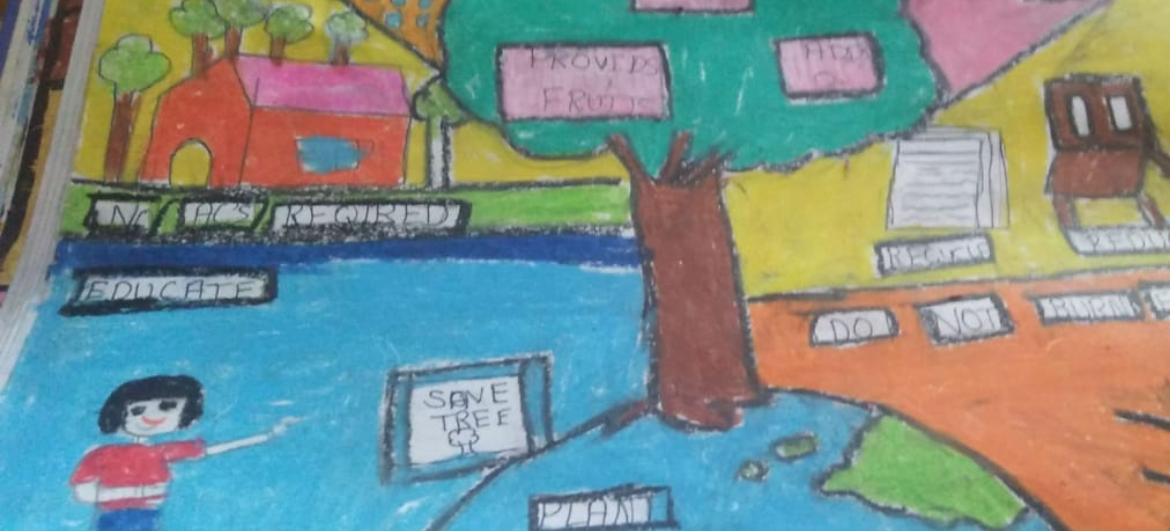Quis autem velum iure reprehe nderit. Lorem ipsum dolor sit nulla or narjusto laoreet onse ctetur adipisci.

Teach for Green (TFG)
Supported by: Wipro
About Teach for Green
While the growing state-of-the-art research and development on environment and environmental issues has a dominant focus on cleaner processes and material loops for large scale industrial purposes, there is insufficient work on why people and societies in general are apathetic towards changing their status quo in terms of green consumption and in transforming themselves towards a green lifestyle. From our extensive work on the field, we have come to understand that there seems to be a sense of detachment between knowledge on environment and its relation with day-to-day life. In remote and rural locations, this is more complex. Not only are many completely unaware of these issues but also lack access to engaged learning and knowledge sharing.
Teach for Green (TFG) bridges this prominent gap between the lack of access to environmental knowledge and the relatable day-to-day actions, by sensitizing rural and semi-rural communities towards environmental issues through an intensive and engaging experiential learning. TFG believes that for learning to add value in actual life of the people in rural and remote settings, it is important that the training be crafted in a way that enables learning experientially in connection to day-to-day life. This approach naturally goes beyond the approach of dry rote learning for achieving momentary success in class tests or terminal exams. In the past few years, we have accomplished environmental sensitization through environmental education in schools with this kind of an experiential learning approach; grassroots education being a historical instrument for social change. At TFG, we perceive schools as not only safe learning spaces but as learning centers with great potential for innovation, which has power to catalyze social change. In this process of creating impact at the school level, TFG expands its outreach to parents and the stakeholder communities; thereby, creating impact at large.
The forests of Uttarakhand are being lost in the name of development, for timber and building of wider roads with occasional forest fires that intensify the problem of deforestation. With decrease in vegetation, landslides are common near the roadways during rainy seasons. The forest fires not only led to depletion in the flora and fauna but also caused economic loss to the state. Due to climate change, the glaciers are melting rapidly and sea levels are rising. In the dry season, the hills face water scarcity.
Teach for Green is an organization, which stands for creating awareness about various environmental problems and promoting sustainable living. TFG envisions a world where individuals and communities are environmentally conscious about their actions and are driven by their own ethos and values. We work at the grassroots level to develop ownership and mindset regarding environment sustainability. TFG aims to educate future generations to not only think of solutions about how to reduce pollution, improve waste management, encourage water conservation, increase energy efficiency, etc.; but also help them realize the implications of future disasters.
In the process of inspiring an adoption of sustainable experiential learning approaches in educational interventions, TFG also works towards strengthening the co-existing relationship between the communities and their surroundings. The aim is to nurture a culture that enhances the symbiotic relationship between the natural environment, its biodiversity, the communities embedded in it, and the sharing of resources that the natural ecosystem and the human settlements offer each other. Currently, TFG works with 30 schools of Champawat, Uttarakhand, 10 schools of Delhi, and 10 schools of Palamu, Jharkhand
Vision
We envision a world where individuals and communities are environmentally conscious about their actions, practice sustainable living, driven by their own ethos and values.
Mission
Our mission is to build a movement of community leaders to foster practices towards environment sustainability. We aim to sensitize individuals and communities towards environmental consciousness by developing an experiential curriculum and an ecosystem, which promotes green enterprise development. We instill curiosity, incept innovation, and encourage self-reliance in individuals to foster community leaders of environmental sustainability.
COVID-19 IMPACT
The world is still coming to terms with the effects of COVID-19, which continues to change everything about life and work. We, as an organization, believe in hands-on learning and experience to grasp a better understanding of the topics. In these unprecedented times, our entire platform went digital. This gave us the exposure to discover these innovative ideas, which we wouldn’t have considered before. Digital teaching, virtual gathering, work from home, tele-health etc. are some technological interventions that promised ‘normalcy’ during these times.
Due to lesser technological advancements and no internet connection, the touch that was once there was somewhat reduced. There were attempts to reflect upon the adaptations implemented by various resource communities towards modeling, pedagogic approaches, organizational practices etc. While we were still acclimatizing ourselves to the guidelines of social distancing and isolation, technological innovations came to our rescue. Constant engagements in humanitarian relief work (ration kits distribution), assistance of parents and vulnerable communities, adapting to the digitized working conditions, etc. provide people with the kind of mental support they were looking for. Adoption of relevant strategies and overcoming all the social, economic, and mental hurdles together helps in the development of a ‘community feeling’ like never before. Debates, like lack of parental interest, lack of electronic gadgets in rural settings etc., were carefully probed and assessed.

